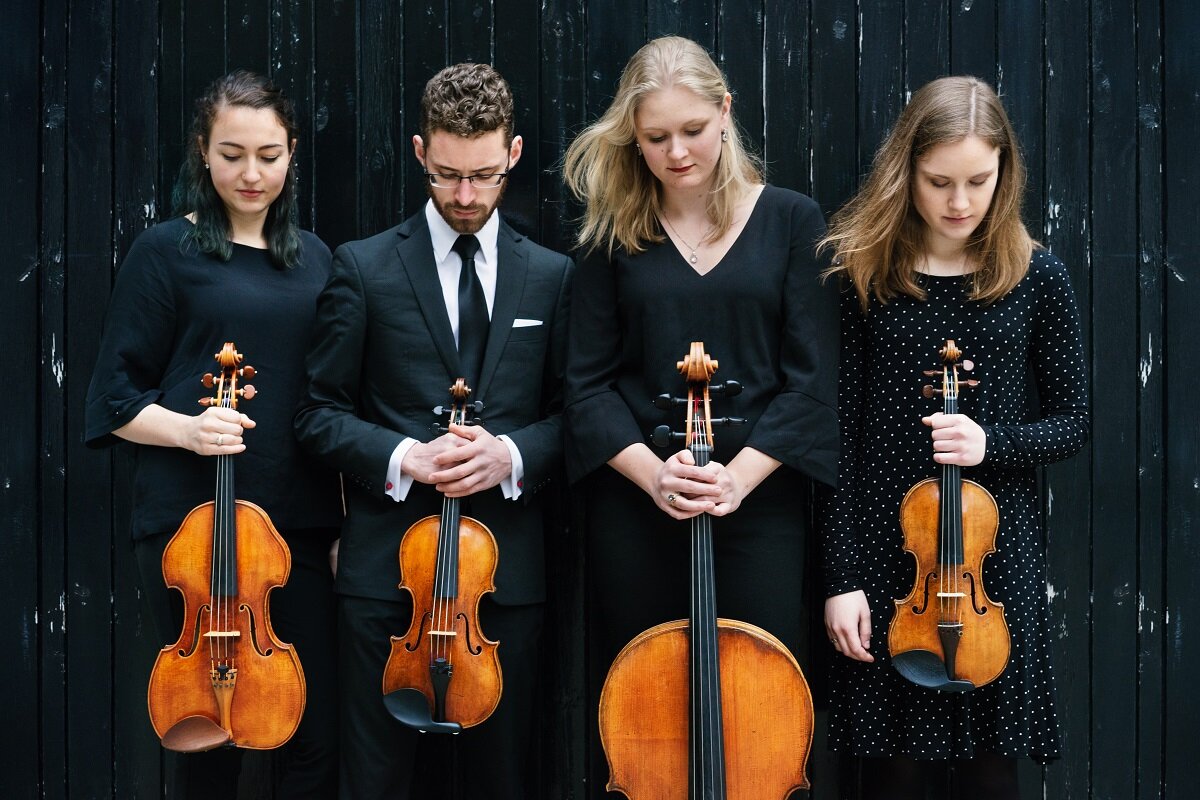Callisto Quartet, from left: violist (check out the shape) Eva Kennedy, violinist Paul Aguilar, cellist Hannah Moses and violinist Rachel Stenzel.
You might think the members of Callisto Quartet are gluttons for punishment.
If you also think a calendar full of competitions means punishment.
The quartet sure doesn’t.
Callisto has entered competitions at Fishoff, Melbourne, Bordeaux, Manhattan, Wigmore and most recently Banff—all in the brief years since they formed at the Cleveland Institute for Music in 2016.
Violist Eva Kennedy doesn’t see the workload as a burden.
“The four of us really enjoy the process,” she says, of her colleagues, violinists Paul Aguilar and Rachel Stenzel, and cellist Hannah Moses. “What we really like the most is not the competition, but preparing for them. For us, it’s preparing the repertoire for the highest level of performance, and finding out what really shows us off in the best way. Having that goal in mind offers a lot of motivation.”
That motivation has paid off: With top prizes at Fishoff, Melbourne and Bordeaux, a second place at Banff this summer, the grind of prepping and competing has resulted in polishing the group’s abilities, and raising their growing profile.
Callisto begins a three-year residency at the Shepherd School of Music at Rice University in the fall, with members pursuing a masters in quartet studies (a second masters for some of the quartet), teaching and performing. It offers regular opportunities not only for advanced coaching, but “guesting with ensembles, performances, collaborations,” Kennedy says.
“The faculty at Rice is world class. We’ve actually wanted to apply to this program from the inception of the group.”
The competitions and residency haven’t kept the group from finding good performances. This year saw their Weill Recital Hall debut at Carnegie Hall, along with appearances at Ravinia and on the Wigmore stage, and a stay at the La Jolla SummerFest.
More great performances like these are the long term goal; for now, it’s lots of work.
“I can speak for all of us,” Kennedy says. “We have a lot of tired rehearsals, and get crabby. There are other things to do without another long quartet rehearsal. But imagining this on a big international stage—you just can’t get that feeling from other performances.”
The hard work stems from early motivation, and perseverance. “We became serious very quickly,” she says. A grand prize in the 2018 Fishoff competition was a strong early sign of potential.
In the competitions, the focus remains on repertory that puts the group in a place to succeed. That means knowing what works, and what doesn’t, in that setting.
“Mozart is really hard,” she says. “It’s the most beautiful music, but it’s way too stressful. We definitely turn more to Haydn. And for Banff, we’re playing Bartok 6, and the first Ligeti. It’s so underrated—we love it, audiences love it and most of the time they’ve never heard of Ligeti. This is music that shows us off.”


